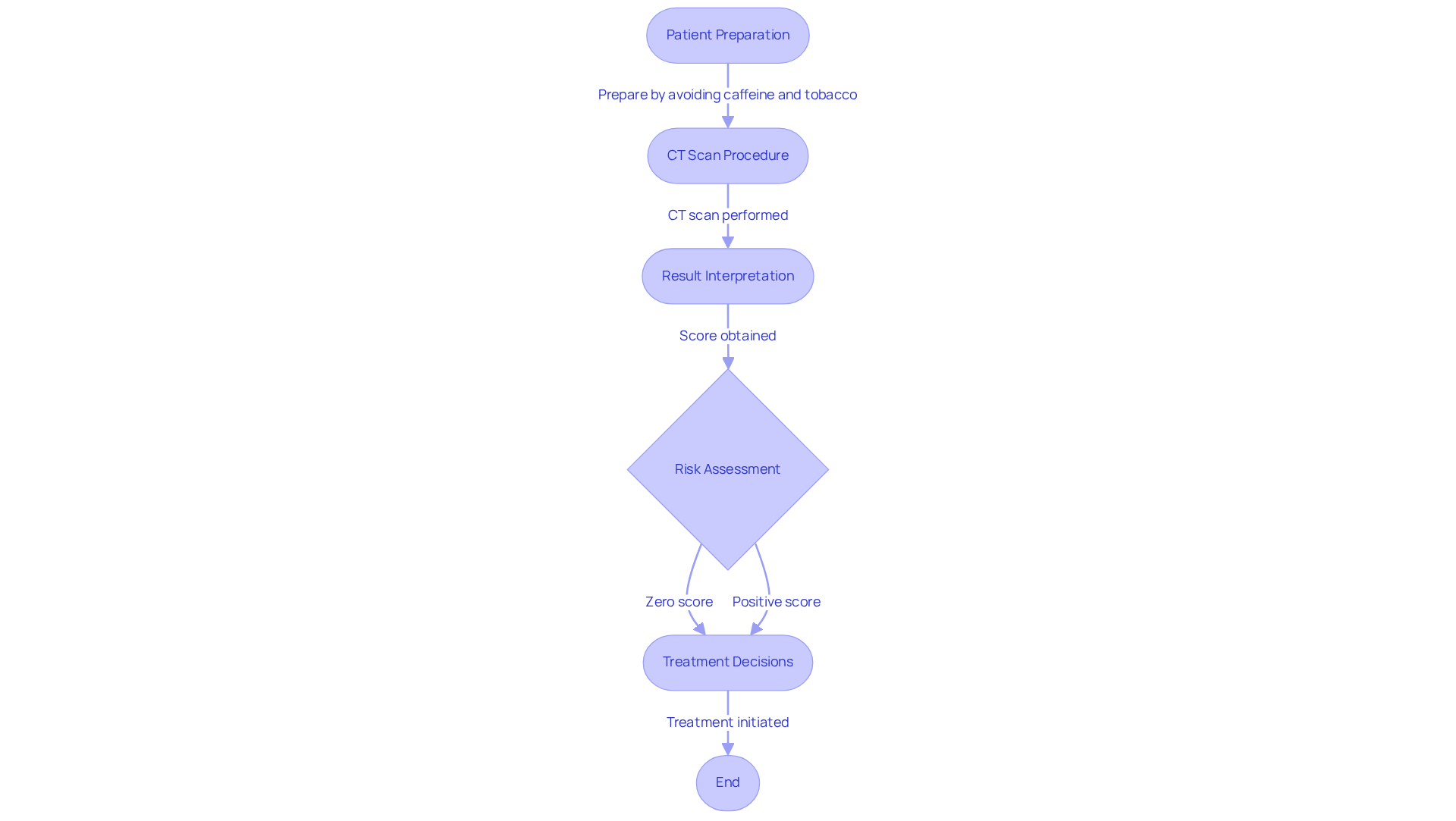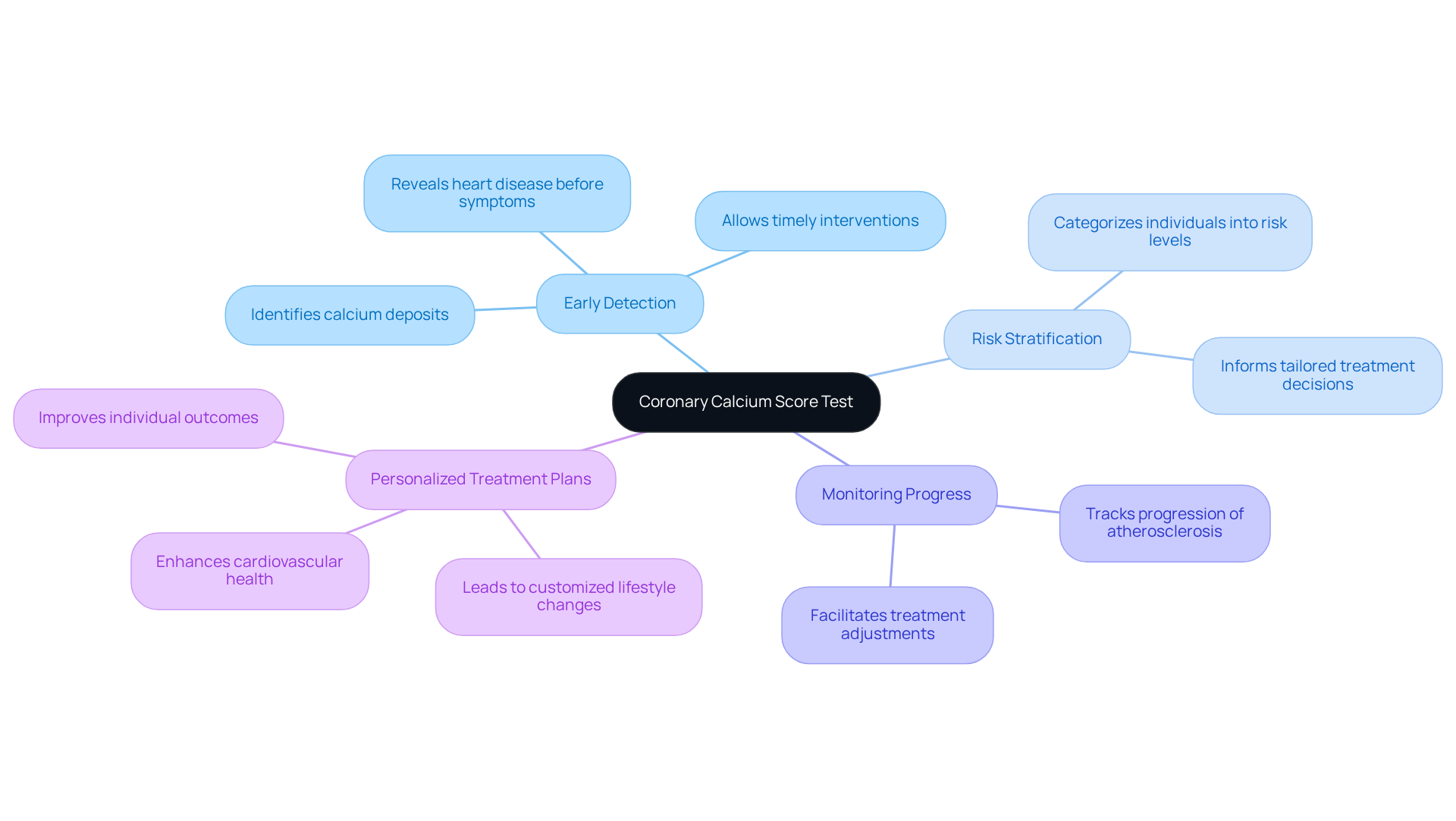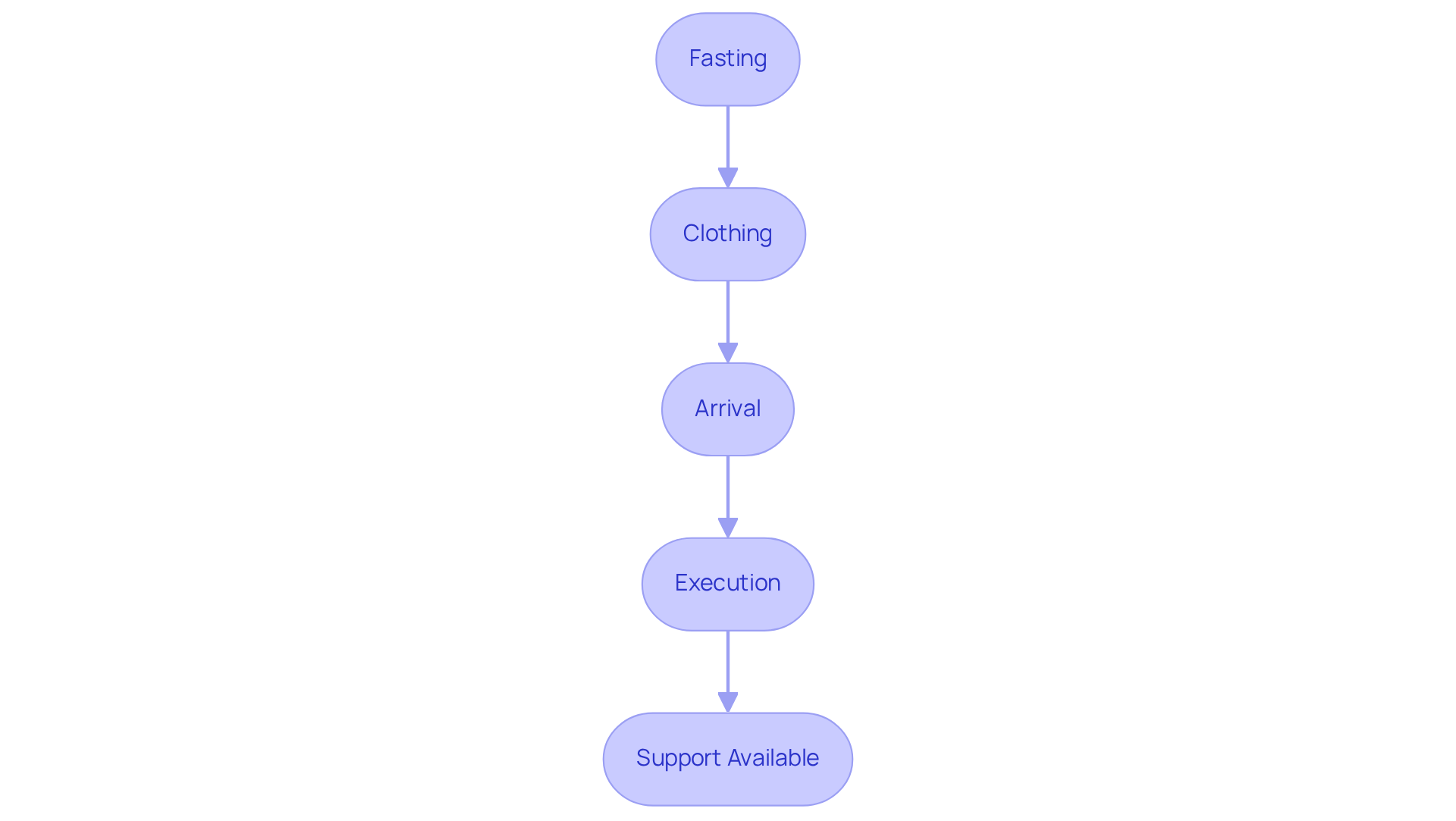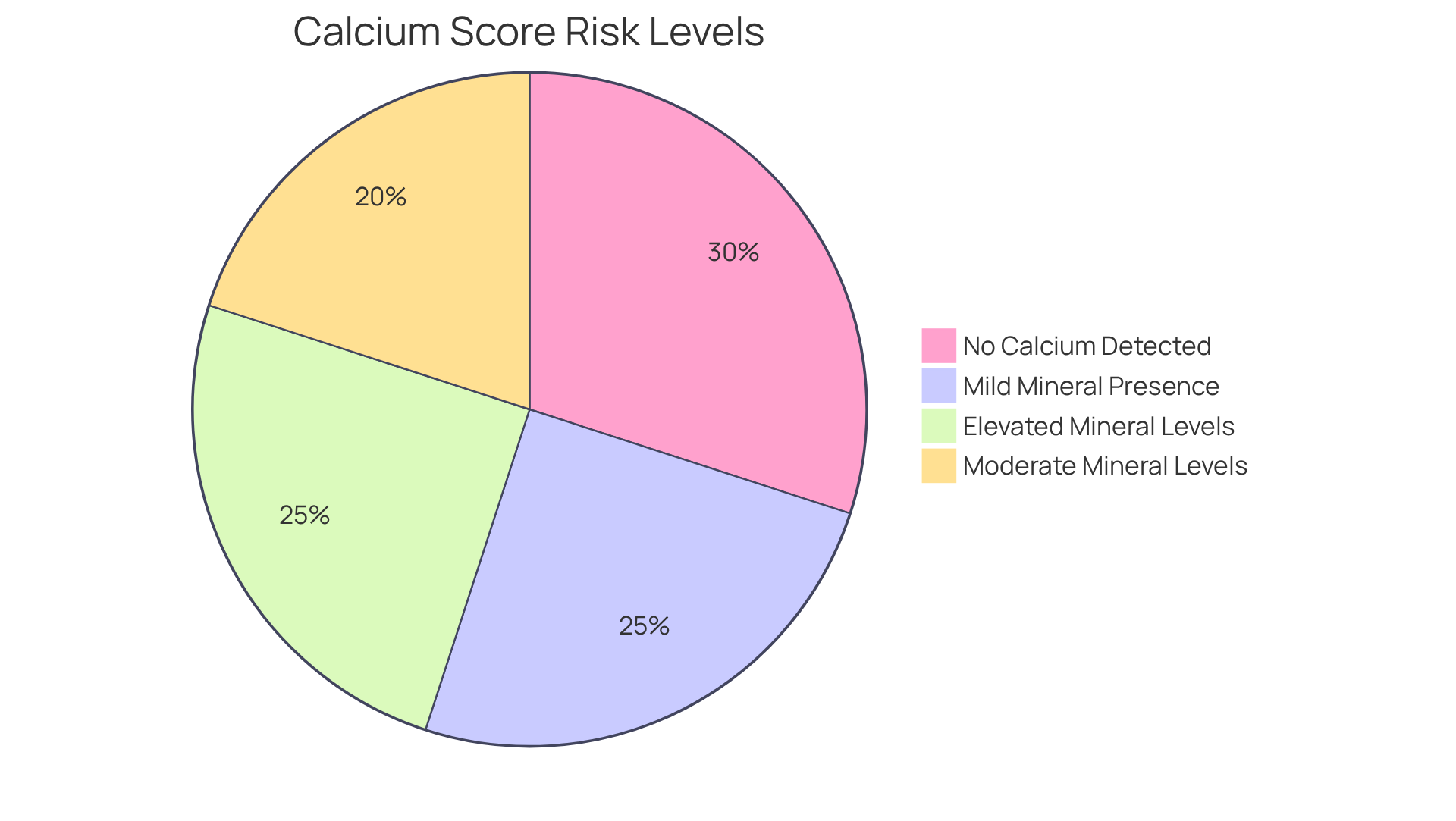


The coronary calcium score test is an important tool for evaluating the presence of calcified deposits in the coronary arteries, which can indicate the risk of heart disease. Have you ever worried about your heart health? This test plays a significant role in early detection, helping to identify potential issues before they become serious. With its high sensitivity in predicting coronary artery disease, the test not only aids in risk stratification but also supports personalized treatment planning.
In addition to this, real-world examples show how successful interventions have been based on test results. Knowing that there are effective options available can be comforting. It's crucial to understand that early detection can lead to better outcomes, and we are here to support you every step of the way.
If you have concerns about your heart health, consider discussing the coronary calcium score test with your healthcare provider. Together, you can explore the best path forward for your well-being. Remember, you are not alone in this journey, and seeking help is a strong and positive step towards taking control of your health.
The coronary calcium score test has emerged as a pivotal tool in assessing heart health, offering a non-invasive method to detect calcium deposits that may signify underlying cardiovascular issues. This test not only aids in the early detection of heart disease but also provides critical insights that can guide personalized treatment plans for individuals at risk. In addition to this, one might wonder: how can a seemingly simple score reveal such complex health dynamics? What implications does it hold for proactive heart care?
Understanding these questions is essential for those concerned about their heart health. This test can be a vital step towards ensuring peace of mind and taking control of one’s health journey. By identifying potential issues early, individuals can work closely with their healthcare providers to develop tailored strategies that address their unique needs. Remember, seeking help is a sign of strength and an important step towards a healthier future.
The coronary calcium score test, often referred to as coronary artery calcium (CAC) scoring evaluation, is a gentle, non-invasive imaging procedure that employs a CT scan to detect calcium deposits in the coronary arteries. These deposits can indicate atherosclerosis, a condition characterized by plaque buildup in the arteries, which may lead to heart disease. The assessment is quick, typically taking just a few minutes, and requires no special preparation other than avoiding caffeine and tobacco beforehand. The results are expressed as a score, helping to evaluate the risk of coronary artery disease (CAD). This coronary calcium score test is especially beneficial for high-risk individuals, such as those living with diabetes, hypertension, or a family history of heart disease, who may not show symptoms but are at risk due to factors like age or lifestyle choices.
At Amavita Heart and Vascular Health®, we prioritize comprehensive cardiovascular care tailored to the needs of those we serve. Our CardioElite™ program enhances this approach by integrating advanced imaging capabilities and real-time diagnostic data, allowing for proactive management of individuals. Recent studies underscore the significance of the coronary calcium score test in understanding cardiovascular health. For instance, a noteworthy finding from the CONFIRM registry revealed that 3.5% of patients with a CAC value of zero had coronary stenosis greater than 50%, highlighting that a zero value does not entirely rule out significant coronary artery disease. Additionally, the sensitivity of a positive CAC result for predicting stenosis over 50% is an impressive 98%, making it a valuable tool for risk stratification. Importantly, the coronary calcium score test indicating a score of zero carries a negative predictive value (NPV) of 93%, reinforcing its reliability in assessing cardiovascular risk.
Real-world examples further illustrate the practical benefits of CAC scoring. Consider the case of a 64-year-old social worker who maintained a healthy lifestyle yet faced high cholesterol. A CAC evaluation revealed a moderate risk level, leading to appropriate medical intervention. This underscores the test's role in identifying individuals at risk who might otherwise remain unaware. Furthermore, it's crucial to recognize that 25% of adults recommended for statin therapy were not receiving treatment, emphasizing the importance of CAC scoring in guiding treatment decisions.
The prevalence of atherosclerosis among older individuals is a significant concern, as heart disease continues to be a leading cause of mortality in this demographic. By incorporating the coronary calcium score test within our CardioElite™ program, healthcare providers at Amavita can more effectively assess cardiovascular risk and implement preventive measures, ultimately enhancing outcomes for individuals. This assessment not only aids in early identification but also informs treatment choices, such as initiating statin therapy for those with high scores, thereby improving overall heart health. However, it is essential for individuals to be aware that the cost of a CAC examination can reach $300, though it often costs $100 or less, and it is typically not covered by Medicare. This financial aspect is particularly significant for elderly patients considering the examination.

The coronary calcium score test is crucial in evaluating the presence of calcified deposits within the coronary arteries, which can indicate potential heart disease risk. This test offers several significant benefits that can provide peace of mind:
At Amavita Heart and Vascular Health®, we utilize advanced diagnostic tools, including coronary plaque measurement, as part of our comprehensive CardioElite™ program. This program not only emphasizes early detection and personalized treatment plans but also aims to reduce hospital readmissions through seamless coordination of care. We are committed to ensuring that individuals at high risk receive the specialized cardiovascular management they need.
If you have concerns about your heart health, we encourage you to reach out for support. Our compassionate team is here to guide you every step of the way, helping you feel valued and cared for.

Preparing for your coronary calcium score test may seem daunting, but by following a few straightforward steps, you can ensure accurate results and feel more at ease.
Fasting: It’s generally recommended that you refrain from eating or drinking, including avoiding caffeine and tobacco products, for at least four hours before the test. However, some facilities may allow you to drink water, so it’s a good idea to check with your testing center for specific instructions.
Clothing: Wearing comfortable clothing is important, and please remember to avoid any metal accessories, such as jewelry, which could interfere with the scan.
Arrival: When you arrive at the imaging center, you’ll lie down on a table that gently slides into the CT scanner. This is where the procedure will take place, and the staff will be there to support you throughout.
Execution: The scan itself is painless and usually lasts about 10-15 minutes. The CT machine captures detailed images of your heart, specifically focusing on the coronary arteries to evaluate calcium levels. During the scan, electrodes will be attached to monitor your heart activity, and you may be asked to hold your breath briefly to enhance the image quality.
Many patients have shared that the process is smooth and quick, often expressing relief at how simple it is. Radiologists emphasize that following these preparation guidelines is crucial for obtaining the most accurate assessment of your heart health, particularly when preparing for the coronary calcium score test. After the scan, you can expect to receive your results from your doctor in just a few days. Remember, you’re not alone in this; support is always available as you take steps toward understanding your health better.

Understanding your heart health is crucial, and the coronary calcium score test can provide valuable insights. The coronary calcium score test produces a numerical value that measures the mineral deposits in your coronary vessels, serving as a vital indicator of your risk for heart disease. Typically performed using a 64-slice CT scanner, the coronary calcium score test provides clear images of the coronary arteries and helps predict coronary artery disease.
The scoring system is categorized as follows:
Comprehending these results from the coronary calcium score test is essential for you, as they can guide discussions with your healthcare provider about heart health and the development of personalized prevention or treatment plans. At Amavita Heart and Vascular Health®, we emphasize a preventive cardiology strategy. For individuals with a calcium measurement exceeding 100, we recommend preventive therapy with aspirin and statins, noting a five-year number needed to treat (NNT) of 24 for preventing coronary events. In contrast, those with a rating of 0 have a much higher NNT of 549, suggesting that preventive measures may not be necessary.
Real-life examples highlight the importance of these ratings: individuals with moderate to high ratings often undergo further testing, leading to timely interventions that can significantly improve outcomes. It's essential for everyone, regardless of their results, to engage in lifestyle modifications such as maintaining a nutritious diet and regular exercise to effectively reduce the risk of heart disease. Additionally, it's important to understand that calcium scores can either increase or remain stable over time, with a mean time of conversion to a positive score of about 4.1 years for individuals starting with a score of 0. This stability underscores the importance of regular monitoring and open discussions with your healthcare provider about your heart health, aligning with Amavita's commitment to comprehensive cardiovascular management through the CardioElite™ program.

The coronary calcium score test is a vital tool for assessing cardiovascular health, especially in identifying calcified deposits that may signal heart disease risk. This non-invasive procedure employs advanced imaging techniques, facilitating early detection and playing a crucial role in crafting personalized treatment plans for individuals with varying risk levels.
Throughout this article, we highlight the importance of the coronary calcium score test. It offers significant benefits, such as:
This test empowers healthcare providers to make informed decisions, ensuring timely interventions that can greatly influence patient outcomes. Moreover, real-world examples illustrate how this assessment can reveal hidden risks in seemingly healthy individuals, underscoring its value in preventative cardiology.
Ultimately, understanding and utilizing the coronary calcium score test can profoundly enhance heart health management. If you possess risk factors for heart disease, we encourage you to consider this evaluation. By prioritizing cardiovascular health through proactive measures and engaging discussions with healthcare professionals, you can improve your overall well-being and reduce the risk of heart-related complications. Remember, you are not alone in this journey; support is available to help you take the necessary steps towards a healthier future.
What is the coronary calcium score test?
The coronary calcium score test, also known as coronary artery calcium (CAC) scoring, is a non-invasive imaging procedure that uses a CT scan to detect calcium deposits in the coronary arteries, indicating potential atherosclerosis and risk for heart disease.
How long does the coronary calcium score test take?
The assessment is quick, typically taking just a few minutes.
Is there any special preparation required for the test?
Yes, patients are advised to avoid caffeine and tobacco before the test.
Who can benefit from the coronary calcium score test?
It is especially beneficial for high-risk individuals, such as those with diabetes, hypertension, or a family history of heart disease, who may not show symptoms but are at risk due to age or lifestyle choices.
What does the coronary calcium score indicate?
The score helps evaluate the risk of coronary artery disease (CAD), with a higher score indicating a greater risk.
What is the significance of a calcium score of zero?
A score of zero indicates a low risk of coronary artery disease, but it does not completely rule out significant coronary artery disease, as some patients with a CAC value of zero may still have coronary stenosis greater than 50%.
How reliable is the coronary calcium score test in predicting coronary artery disease?
The sensitivity of a positive CAC result for predicting stenosis over 50% is 98%, and a score of zero has a negative predictive value (NPV) of 93%, making it a reliable tool for assessing cardiovascular risk.
Can you provide an example of how the test has been beneficial?
An example includes a 64-year-old social worker with a healthy lifestyle but high cholesterol, whose CAC evaluation revealed a moderate risk level, leading to appropriate medical intervention.
What is the cost of the coronary calcium score test?
The cost can reach up to $300, though it often costs $100 or less, and it is typically not covered by Medicare.
Why is the coronary calcium score test important for treatment decisions?
It aids in identifying individuals at risk who might otherwise remain unaware and informs treatment choices, such as initiating statin therapy for those with high scores.